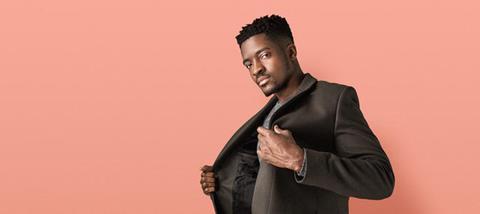Multi-award-winning rap artist Guvna B released an album earlier this year that speaks honestly about his grief following his father’s death. Editor Ruth Jackson spoke to Guvna about faith, vulnerability and hope

Ruth Jackson: How did you become a Christian?
Guvna B: My parents moved from Ghana in their early 20s. In most African countries faith is a huge part of the culture. My family were Christian, so one of the first things they did when they got to London was find a local church and they started taking me when I was young. But I don’t think they ever taught me what it meant to be a Christian at my age. They just expected it to be a way of life for me. I was about 14 the first time I actually heard the gospel, but I shied away from it and was still living a ‘lukewarm’ life. In church I’d behave one way, but on my estate or at school it was very tough for me not to compromise.
RJ: What changed?
GB: My youth leader found out I’d been suspended from school and was shocked. He was like: “No way, he’s an amazing kid.” After he did some digging he found out I was far from a great kid. He sat down with me and explained what it truly meant to be a Christian, what Jesus did for me and why it would be really beneficial for me to at least try to live for Jesus wholeheartedly. That was the first time anyone had sat me down, and he was just a normal guy. He liked the same kind of music as me and understood my culture. I don’t think you have to be exactly like the people you’re speaking to, but it definitely helped.
That youth worker literally changed my life, and it’s why I do youth work now. I know how much of a change it can make in someone’s life if the right person is there at the right time. I love this quote: “Be who you needed when you were younger.” That’s what I try to be to young people.
RJ: Your recent album Hands Are Made for Working is raw, honest and authentic. What inspired those songs?
GB: It was never meant to be an album. I actually had my album 80 per cent completed, and then my dad passed away and it kind of put everything on pause. A couple of months after he died I was on tour with Matt Redman. I had a day off, so I just started writing a diary because my mum and wife told me I hadn’t really communicated how I was feeling.
I find it really hard to write about how I’m feeling, so I started to write a lyrical diary. I just started to rap my thoughts and they were some of the easiest lyrics I’ve ever written because they were straight from the heart. I didn’t ever think they’d see the light of day; I felt that kind of content was way too honest and real and vulnerable. But I just got the bravery and God gave me peace about sharing it, so that’s why I decided to put it out.
RJ: How do you reconcile losing your dad with your faith?
GB: Not very well! I guess the first month or so I was in deep shock. I didn’t really pray at all. I didn’t really have a relationship with God in those moments; I was kind of in autopilot. I’m the eldest child, so my main priority was to be there for my mum and younger brother.
The thing that made it difficult for me to find out what my faith meant in all this was people saying: “Don’t worry, things will get back to normal soon” or “God is still good”. In my head I would think: “Things won’t get back to normal. They’ll be very different.”
It’s better to be a light than to curse the darkness
I learnt to see the blessing in every day and found that even on the worst days there are still things I can be grateful for. Psalm 13 was massive for me, and it was the first time I’d really taken it in. David was saying stuff like: “How long will you hide your face from me, Lord?” He was being brutally honest and that was a game changer because I felt I could pray honest prayers. In the church I grew up in it was like you weren’t allowed to doubt God, but rereading Psalm 13 made me see I’m allowed to tell God how I truly feel. If there’s a God big enough to deal with my doubts, anger and questions, that’s a brave God and I’m happy to keep giving this a go.
RJ: What would you say to a young person experiencing grief?
GB: I think everyone’s different, but for me – someone who struggles to communicate how I’m feeling – my mates coming round to have a drink or play PlayStation was really helpful. They might not know the right words to say, but knowing they’re there is enough.
That youth worker literally changed my life, and it’s why I do youth work now
RJ: ‘Summer in the streets’ contains a voicemail from your friend Daisy, who passed away five months after your dad. That must have been incredibly difficult to write…
GB: Yeah, that was really hard because Daisy was my best friend at secondary school. Both of those big scenarios happening in one year was a lot to deal with. Daisy sent me a Christmas card the day before she died, which I got a couple of days after she passed away. That was a massive lesson to me to try and be there for my friends as much as possible and check up on them and do things like send nice texts and Christmas cards.
RJ: Do you think young people find it difficult to communicate their feelings?
GB: Yeah, because now more than ever we are very critical of other people’s decisions. But I feel like everyone’s got an outlet: something they enjoy doing that’s a way of them coming through whatever they’re going through. That could be writing lyrics, talking to someone, drawing pictures. You’ve just got to find out how your brain works and how you feel comfortable processing your thoughts and emotions. That’s the mistake a lot of people make: thinking there’s only one way to deal with issues.
RJ: There’s a song on your previous album called ‘Easy road’, which was written about a friend who took his own life. What would you say to a young person struggling with mental health difficulties?
GB: People love you! My friend who committed suicide was so loved. He had a little boy and a girlfriend, and all his friends thought the world of him. He’d smile every day, but we didn’t know what he was going through. He didn’t know how much he was loved. I’d say if you’re going through something, talk about it with people who love you. As those who work with young people, we’ve got the chance to make a huge difference in someone’s life.
RJ: How do we show young people that God is relevant?
GB: One of my favourite people was a youth leader in his 50s. He had a rubbish dress sense, but he cared about us. I was like, this is the least cool person I’ve ever met, but he cares and that’s super relevant. You just need to be yourself and care. Young people respond to that.
RJ: The way you talk about pain on your new album feels so relevant. It gives young people permission to tell their own stories, doesn’t it?
GB: Yeah, and I’m grateful I did that. People around me said: “Are you sure you want to put this out?” because it’s a bit much. It’s not that I want to put out pain irresponsibly, but sometimes the Church can put out truth irresponsibly and they don’t prepare people for real-life situations. We serve a big God, so we can put out how we’re truly feeling and just trust that collectively we can deal with it.
RJ: How can we balance being honest while leading our children and young people responsibly?
GB: The foundational things that help us get through – God’s love, peace, protection and favour – still stand. I feel like we can talk about our pain, but it doesn’t have to end there. We can work with people to show them God’s love, truth, peace and word.
RJ: Have you got a favourite lyric on the album?
GB: Maybe in ‘Heart of a king’: “It’s better to be a light than to curse the darkness”, especially with what’s going on at the moment in drill music and youth culture. I’ve done a few interviews recently with people who haven’t been to areas where these things are happening, and they don’t have relationships with young people. They’re just pointing the finger. I think it’s a lot better for society if we look in the mirror and say: “I’m going to be a light in someone’s life rather than just pointing fingers and cursing all the dark stuff that’s happening.”










































